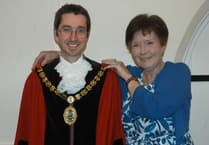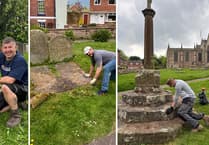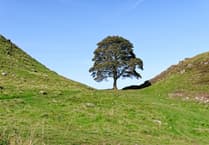With drastic weather changes and the implications of Brexit, the future of traditional farming in the UK is becoming increasingly unclear and is leading some farmers such as Ross-on-Wye farmer Ally Hunter Blair to think of new innovative ways forward to help sustain Britain’s proud farming heritage.
Ally - who is currently starring in a new television programme Born Mucky: Life on the Farm - farms 500 acres of Herefordshire land, owned by the Duchy of Cornwall. Weir End Farm, at Ross-on-Wye, is run by 32-year-old Ally, who grew up there before taking it over in 2012 from Mum, Alison and Dad, Graham.
A traditional arable farm, Ally and his team grow a number of various crops such as wheat and barley, oil seed rape and sugar beet but have recently decided to experiment with planting soya beans following a visit to a farm in South America.
“We went out to Uruguay a couple of years ago and whilst there we visited this soya plantation”, said Ally.
“They were growing them on a massive scale and because they crop it twice a year over there it was proving very profitable. We decided to look into it on returning home and eventually decided to go for it.
“2018 proved to be a great year due to the long hot summer as Soya grows upright and needs the heat, we grew about a tonne an acre although due to the wet summer we’ve just had we didn’t harvest until October this year.
‘‘So far it has proven to be a worthwhile venture and a successful model as soya is more profitable than peas, the rotation works well and there is no cultivation so it lets the soil heal naturally.”
This foray into planting soya beans hasn’t been the only experimentation going on at the farm with the Blair family also in the process of renovating an old horse-box for glamping.Speaking about the new venture, Ally said: “Yeah it has been something we have been looking into for a while, just as a way to differentiate a little bit and provide some additional income. My wife is a horse-riding instructor so she also provides lessons on the farm. The way farming is going it is important to come up with new ideas that can provide income because the future of farming is becoming increasingly unpredictable.”So how has farming changed in his years since taking over in 2012?“As an arable farmer the big change over the last few years has been the machinery, obviously increased machinery leads to increased out-put so we always have to have a fair amount of kit on site.‘‘Twenty to thirty years ago my Dad would have several staff working on the farm, work that could provide for two or three families, whereas now we have much less staff due to the technological advancements with machinery and we also need to differentiate into new ideas (glamping, planting soya beans) to provide the income to support a family.”With the UK poised to finally leave the EU at the end of the month, like most industries the consequences of Brexit hold a dark shadow over the future of UK farming, something Ally is all too aware of.“With regards to Brexit like everyone else I’m just tired of it”, said Ally.“Obviously like most other industries it will have a massive impact on farming, both arable and livestock. For us arable farmers there are factors such as fluctuating prices of wheat and other crops that we grow on a large scale as well as questions like ‘Where will be able to sell after coming out?’ and ‘Will the UK market be flooded with imports?’.‘‘As farmers we also have to wonder whether our produce will be in less demand in our own country, and I just hope that one way or another we get some clarity on the issue soon.”All of which is why Ally hopes that Quest’s new farming programme will increase public awareness of the importance of UK farming.“I’ve watched the programme (Born Mucky) and am pretty happy with how it has come out. I think it is very factual, which can only be a good thing in showing members of the public our way of life as farmers.‘‘Shows like this are important because farming has missed a trick with this generation. Social media is king, some influencers can have as many as one million followers and suddenly the outreach is so much wider whereas farming tends to rely on word of mouth, and I think farming organisations need to look into helping engage the public more.”





Comments
This article has no comments yet. Be the first to leave a comment.